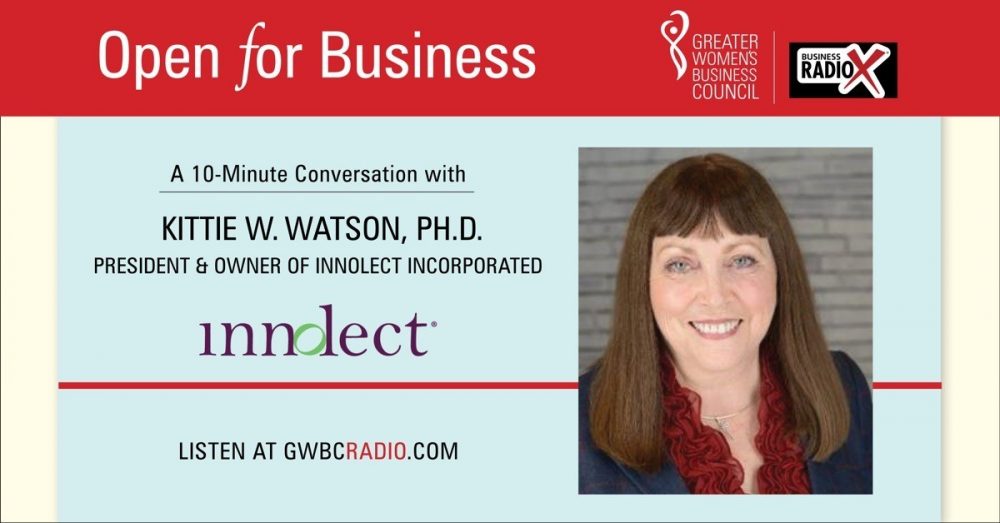

 Kittie Watson is the President and founder of Innolect, and has a passion for “Growing the Leader in Everyone.” With a deep appreciation for the challenges faced by executives in high-stakes settings, she focuses on mission-critical business needs. Her expertise in transformational change, strategic communication, talent development, executive assessment and coaching is valued by Fortune 500 and diverse companies such as Bayer, Entergy, Cricket, Pfizer, Zoetis, Carolina’s Healthcare, Compass and Southern Company.
Kittie Watson is the President and founder of Innolect, and has a passion for “Growing the Leader in Everyone.” With a deep appreciation for the challenges faced by executives in high-stakes settings, she focuses on mission-critical business needs. Her expertise in transformational change, strategic communication, talent development, executive assessment and coaching is valued by Fortune 500 and diverse companies such as Bayer, Entergy, Cricket, Pfizer, Zoetis, Carolina’s Healthcare, Compass and Southern Company.
Kittie designs fresh ways to grow capability and increase ROI within leaders, teams and workplaces. Integrating her personal values and work practices, she encourages clients to build strong, vibrant leadership pipelines by partnering with nonprofit organizations. Focused on creating more inclusive cultures, she quickly sizes up the crux of tough situations and provides leaders with powerful solutions that payoff for themselves and significant stakeholders.
As one of the first and youngest female chairpersons at Tulane University, Kittie is among the top 25 most prolific women writers in communication. She has authored or co-authored 15 books, numerous articles, and been featured on ABC’s 20/20. When not supporting clients, Kittie is an advocate for social justice issues, visualizes a universe of possibilities through watercolor paintings and kayaks/hikes to relax.
Follow Innolect on LinkedIn, Facebook and Twitter.
TRANSCRIPT
Intro: [00:00:04] Broadcasting live from the Business RadioC Studios in Atlanta, Georgia, it’s time for GWBC Radio, conversations to grow your business. Now, here’s your host, Roz Lewis.
Lee Kantor: [00:00:26] Lee Kantor in for Roz Lewis today. And today on GWBC Radio, we have a great guest. We have Kittie Watson. And she is with a firm called Innolect. Welcome, Kittie.
Kittie Watson: [00:00:37] Thank you so much, Lee. I appreciate being here.
Lee Kantor: [00:00:40] Well, before we get to far into things, tell us a little bit about Innolect. How are you serving folks?
Kittie Watson: [00:00:46] Well, we are an organization development and executive development leadership consulting firm. And so, what I usually say is that we grow the leader in everyone. And what we’re doing now is really helping leaders think about how do they navigate the organizational white-water that they find themselves in, so that they can keep their talent engaged and motivated during this time of uncertainty.
Lee Kantor: [00:01:13] Now, that’s an interesting topic about leadership specifically. Do you mind talking about leadership just in general like from a macro standpoint?
Kittie Watson: [00:01:24] Not at all. How would you like me to begin?
Lee Kantor: [00:01:26] Okay.
Kittie Watson: [00:01:26] I need some direction to go into that.
Lee Kantor: [00:01:26] Okay. Here we go. Do you believe that everyone can be a leader? Or is that something some people are born with leadership skills and other people are not? Or is it something that you can take somebody, and then make them a leader or demonstrate leadership?
Kittie Watson: [00:01:45] We really believe that every person in an organization can demonstrate leadership skills. There are some that are groomed for more executive leadership for the whole organization, but whether you’re a team member or a part of an executive team, leaders can grow, and learn, and become their best selves. We really work to help people become very authentic in how they lead, so that people want to follow.
Lee Kantor: [00:02:13] So, there’s some skills that you can just kind of plus up. If I just threw a person in front of you, you’d be able to kind of work with them within their kind of personality and their traits, and then kind of plus up their leadership skills if you give them certain tools?
Kittie Watson: [00:02:31] Well, we do do a lot of executive coaching. And so, in those cases, we identify what a person needs to work on based on working with their manager or something that they’ve seen themselves. So, today, for example, I was talking to a leader that really wants to develop his executive presence, especially now during the coronavirus crisis. And what does he need to do to show up and to be authentic with them? And we talked about his need to be vulnerable, and to demonstrate courage, to be the whole person he needs to be, and to tell the truth. So there are some characteristics, especially now, that leaders can show, and we can help leaders develop those skills through the executive coaching process now.
Lee Kantor: [00:03:15] So, a leader doesn’t necessarily have to come prepared with all the answers. That’s what I’m hearing you saying. They can be vulnerable, and be authentic, and say, “Look, this is a tough time for everybody.”
Kittie Watson: [00:03:30] Definitely. I think more than anything right now, one of the great coaches that we talk about sometimes is Lou Holtz, who worked with the Notre Dame football team, winning football team. And one of the things that he said is that leaders, in particular, with their employees that the employees need to know they can trust you, they need to know that you care about them, and that you’re committed to working for excellence. That’s even during this time of uncertainty. Our employees need to know that we are there for them, but that we’re moving toward another goal, that we are going to ride this wave. And sometimes, we call it a rogue wave, something really unexpected, and that’s what people are experiencing right now. So, leaders have some important role to play during this time.
Lee Kantor: [00:04:21] Now, do you see some mistakes that organizations make when it comes to leaderships time and time again that you’re like, “Oh, here we go again”?
Kittie Watson: [00:04:30] Well, the biggest mistake is that when people are promoted from technical roles into management leadership roles, where they have the technical skills, but they don’t have the people skills. Often, we are working with leaders to help them develop the skills needed that are going to help them manage and lead. You can be really good at something technically but not know how to work with people in such a way that they want to give their best selves to work.
Lee Kantor: [00:05:01] Now, when you’re doing your coaching, and you’re working with this leader or budding leader, how do you kind of coach them up when it comes to listening?
Kittie Watson: [00:05:14] Well, listening, it’s really an area of our expertise, and it’s one that I’ve done a lot of research. And I taught at Tulane University for 20 years, actually. I was Chair of the Department of Communication. And I think the biggest thing with listening is to be aware as a leader of some of your irritating listening habits. We have developed these listening habits over years and, often, are unaware that what we might be doing to pose our employees down or to make them feel as though their ideas and contributions aren’t valued. So, for example, a leader might have an irritating listening habit of interrupting an employee when he or she is giving ideas, or he or she might immediately say something, “Yes, but we’ve done that before.” So, we can do things as leaders that would give the impression that we’re not really caring or listening to our employees.
Lee Kantor: [00:06:07] Now, where does kind of corporate culture fit into this? Does that come before the leadership or does leadership kind of drive the culture?
Kittie Watson: [00:06:16] Well, many organizations might start with a foundation that they have, that has their vision, mission and values, but it’s how it’s operationalized that becomes a culture. So, departments within an organization can have their own cultures based on the leader that’s in it. So, the leader is aligned with the organization’s values and mission, will have specific kinds of expectations that they have of their employees and themselves. And it might be inclusive behaviors, for example. It might be how we treat each other with respect. It might be how we operate and include others in a team environment and how we work as a team. All of those are part of the culture, and the leader demonstrates that and guides the team. And we really believe leaders are guides. They guide employees where they need to go for the organization to be successful.
Lee Kantor: [00:07:14] Now, when you’re working with maybe a C-suite that kind of all looks the same, how do you open their mind to the benefits of inclusion, diversity, and that everybody kind of opening up kind of a wider net maybe for your talent and your executive pool?
Kittie Watson: [00:07:32] Well, I think, when I think of an executive team, I don’t think of them as all looking the same. There is more diversity now than there has been. There still needs to be more, but in addition to the diversity that we can see, there’s so many aspects of diversity that we don’t see in the way that people think or even disabilities that a person might have. So, what we do is really begin to look at a person’s strengths and build on those strengths, so that we can then get other people that have some different strengths, so that they can move toward the goals that they’re trying to achieve.
Lee Kantor: [00:08:08] So, you like to work from the strengths outward rather than kind of work on the weaknesses first?
Kittie Watson: [00:08:15] Well, and leaders, especially in the executive team, the reason that they’ve gotten to that level is because of their ability to perform, and they have used particular strengths to get there. So, if you begin to forget about how you got there, you may not be able to maximize the benefits that you’ve acquired to the years. At the same time, we do believe that leaders continue to develop and grow. And many times in organizations, we’re looking at what we call horizontal development, and we’re trying to add a skill set. So, negotiation, or influence, or something to that effect.
Kittie Watson: [00:08:53] What we do often with leaders, especially in the C-suite, is to help them think about expanding the capacity to grow and learn. And this is more vertical development. So, it’s a person’s ability to think more strategically. It’s a person’s ability to have higher emotional intelligence, to look further out into the future. Those that are more developed with their leadership and abilities are able to look further out, make connections among things within the organizations, and not just within their own areas of expertise.
Lee Kantor: [00:09:29] So, how do you kind of get a baseline of where the leader is at and to know which areas to work on? Are they saying, “Look, I want to be better at negotiation,” or is the board saying this person has to get better at negotiation? Like how do you kind of know what area to pursue?
Kittie Watson: [00:09:46] Well, we have a number of assessment tools and ways that we look at that. I mean, some of it is individual assessment or maybe a 360-assessment where the board is involved, their peers are involved, and even their direct reports give them feedback that they might not have gotten on their own. Sometimes, it’s difficult, even when we ask for feedback, for people that work for us or with us to be as candid and direct as we might want them to be. In addition to that, our company is certified in dozens of assessment tools and instruments, and some that allow the leader to look at him or herself differently. And then, based on those that data that we get, we’re able to create an individual development plan and work in partnership with others in the organization.
Lee Kantor: [00:10:38] Now, is there kind of a timeline or a usual amount of time where the leader starts seeing kind of results that they can actually see that don’t maybe necessarily feel good, but it’s like this is really improving part of my bottom line?
Kittie Watson: [00:10:57] Well, the research shows that executive coaching, when done right, definitely pays for itself. And some of that, the payback is through retention of key people. It’s through reducing that kind of turnover. But what you’re asking about is, do you see something immediately? In some cases, yes. So, if you’re working with a leader and identifying something that they’ve never seen before, a blind spot, they can immediately see it. It may take some time to change the habit that they’ve had and have developed and reinforced through years of being who they are as a just an individual.
Kittie Watson: [00:11:36] What we find, though, because of using a business development plan focused on that individual, that you move toward the results that you want to achieve, and then you put in the practices and reinforcement that are going to allow that person to be successful over time. We also know that it’s not just the coach that makes that leader more successful, it’s the people around him or her. In particular, Lee, that their manager, or the board, or someone that has them accountability, as an accountability partner with them to help them see themselves more effectively.
Lee Kantor: [00:12:16] Now, during this crisis, is your firm proactively reaching out to your clients and saying, “Hey, let’s brainstorm,” at least discuss some ways that you’re dealing with this, and maybe there’s ways that you can help them kind of deal with this?
Kittie Watson: [00:12:33] We definitely are. And because we can operate effectively virtually, not only are we continuing our executive coaching practices and working with leaders around the United States and actually the globe with our coaching, but we’re also doing more with webinars, and group meetings, and facilitating those meetings in ways that engage people. We’re helping leaders right now think about the best ways to ensure that they’re keeping people connected, especially those that haven’t worked in a virtual environment before.
Kittie Watson: [00:13:10] So, there are many of our clients that have worked more virtually and others that have always expected the employees to be at their desk every day. And that’s very different than what we’re experiencing now. So, in the next couple of weeks, for example, we are facilitating some webinars that some organizations have requested of us. And one of those is around authentic leadership and navigating organization whitewater. So, we look at the whitewater. If you’ve gone rafting before, there are different classes of rapids. And for many organizations, this is the highest class of rapid any of us in the United States have ever seen before. And so, what do we do to keep our employees engaged, to keep them in the boat basically, so that they are not checking out on us? And we need to give them new tools, new strategies, new ways of really operating. So, we’re working with our senior leaders and leadership teams to begin to think about how they engage differently within a virtual workplace.
Lee Kantor: [00:14:21] Now, let’s talk a little bit about GWBC. Why is it important for you to be involved with that group? And what has that group done to help you and your team succeed?
Kittie Watson: [00:14:33] Well, the Greater Women’s Business Council has been a wonderful place for me to not only learn but also to grow. And I served on the board of the Greater Women’s Business Council for a number of years and won a number of awards through the service. But I think it’s by giving back that you get even more. So, by serving on the board, by serving on committees, GWBC allows you to work with other women business leaders that are in the same boat, that is because we’re talking about water. And we understand what each other is going through right now with operating very differently having our worlds, in many cases, turned upside down.
Kittie Watson: [00:15:16] And so, GWBC is doing all that it can to provide the resources and information that will allow us to navigate successfully through these uncertain times. So, it may be through radio programs like this, or it may be through providing information from the Small Business Administration on the Payroll Protection Act. But what GWBC does is to operate as a resource for women-owned businesses, not only to support each other, but to actually provide the information to help us be most successful.
Lee Kantor: [00:15:53] And it’s a good lesson for a young kind of maybe new business leaders to think about joining and being part of because, like you said, you have this sense of community and support. But also, there’s opportunities for yourself to demonstrate leadership skills by volunteering and being active as a member that can help you in your career as you go forward.
Kittie Watson: [00:16:17] Yeah. And one of the things that the BBC has done, and I have served in this role on several years, is we have a mentoring program. And that mentoring program is for new business owners to help them be successful. And it’s a wonderful opportunity to learn some things that maybe you didn’t have in your education process, to hear about best practices that other companies are using, and to learn from people that have gone through a similar journey to you. So, GWBC offers that through the women in the community. And that allows you to think differently, to explore other options, to be exposed to new tools and resources that we might not have thought of on our own.
Lee Kantor: [00:17:05] You mentioned earlier that the situation we’re in is kind of like a rogue wave. And as you mentioned, just the situation itself is a rogue wave. And then, if you couple that with an organization that’s never had to deal with remote workers, now, you’re really piling on a lot of stress and a lot of variables that they’ve never dealt with before. I’m sure you’ve got your work cut out for you when you’re trying to help these firms kind of weather the storm here.
Kittie Watson: [00:17:32] Well, it’s hard. And part of it is that even though we have heard that people say, “Bring your whole self to work,” there’s no other time like that right now where you’re having a conference call and there’s children and dogs and things in the background, right? Each person is navigating so many different things right now, whether it’s a young family, whether they live alone. And so, there’s isolation. Each of us, as a leader, needs to think about employees uniquely and what their unique needs might be during this time, so that we, as a leader, can be more of that servant leader to them and be able to help them move through this process for success when they come out the other end.
Kittie Watson: [00:18:22] It’s what we do now that’s going to provide the foundation for us to actually weather this and to come back stronger than we were before. And I believe that it’s all of our communities, and it’s GWBC, it’s a greater community of how we respond to the needs of all the people that are hurting right now. If we can do that, that we will learn some things that we can apply for the future.
Lee Kantor: [00:18:53] Amen to that. That is some great advice and wise words. Well, Kittie Watson, thank you so much for sharing your story today. If somebody wanted to learn more about Innolect, is there a website that we can share?
Kittie Watson: [00:19:05] Definitely. Our website is innolectinc.com. And that’s I-N-N-O-L-E-C-T-I-N-C dot com. And on the website, you will find different post, and information, and so many things that we’re writing right now to help organizations and to help leaders help their employees. And we hope that that can be a resource that people can use as they come out to the other side of what we’re going through right now.
Lee Kantor: [00:19:38] Well, congratulations on all your success. And thank you so much for sharing your story today.
Kittie Watson: [00:19:43] Thank you, Lee. I appreciate having the opportunity with you today.
Lee Kantor: [00:19:47] All right, this is Lee Kantor. We will see you next time on GWBC Radio.
About Your Host
 Roz Lewis is President & CEO – Greater Women’s Business Council (GWBC®), a regional partner organization of the Women’s Business Enterprise National Council (WBENC) and a member of the WBENC Board of Directors.
Roz Lewis is President & CEO – Greater Women’s Business Council (GWBC®), a regional partner organization of the Women’s Business Enterprise National Council (WBENC) and a member of the WBENC Board of Directors.
Previous career roles at Delta Air Lines included Flight Attendant, In-Flight Supervisor and Program Manager, Corporate Supplier Diversity.
During her career she has received numerous awards and accolades. Most notable: Atlanta Business Chronicle’s 2018 Diversity & Inclusion award; 2017 inducted into the WBE Hall of Fame by the American Institute of Diversity and Commerce and 2010 – Women Out Front Award from Georgia Tech University.
She has written and been featured in articles on GWBC® and supplier diversity for Forbes Magazine SE, Minority Business Enterprise, The Atlanta Tribune, WE- USA, Minorities and Women in Business magazines. Her quotes are published in The Girls Guide to Building a Million Dollar Business book by Susan Wilson Solovic and Guide Coaching by Ellen M. Dotts, Monique A. Honaman and Stacy L. Sollenberger. Recently, she appeared on Atlanta Business Chronicle’s BIZ on 11Alive, WXIA to talk about the importance of mentoring for women.
In 2010, Lewis was invited to the White House for Council on Women and Girls Entrepreneur Conference for the announcement of the Small Business Administration (SBA) new Women Owned Small Business Rule approved by Congress. In 2014, she was invited to the White House to participate in sessions on small business priorities and the Affordable Care Act.
Roz Lewis received her BS degree from Florida International University, Miami, FL and has the following training/certifications: Certified Purchasing Managers (CPM); Certified Professional in Supplier Diversity (CPSD), Institute for Supply Management (ISM)of Supplier Diversity and Procurement: Diversity Leadership Academy of Atlanta (DLAA), Negotiations, Supply Management Strategies and Analytical Purchasing.
Connect with Roz on LinkedIn.
About GWBC
The Greater Women’s Business Council (GWBC®) is at the forefront of redefining women business enterprises (WBEs). An increasing focus on supplier diversity means major corporations are viewing our WBEs as innovative, flexible and competitive solutions. The number of women-owned businesses is rising to reflect an increasingly diverse consumer base of women making a majority of buying decision for herself, her family and her business. 
GWBC® has partnered with dozens of major companies who are committed to providing a sustainable foundation through our guiding principles to bring education, training and the standardization of national certification to women businesses in Georgia, North Carolina and South Carolina.














